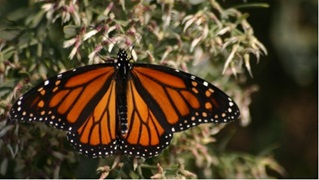Milkweed for monarchs
Preserving pollinator habitat on the U.S. Gulf Coast
Wherever there’s milkweed, there will be monarch butterflies.
Sometimes called the “milkweed butterfly,” the monarch uses the plant for all its lifecycle stages, including the toxins, making it a poisonous snack. But a drastic loss of crucial habitat is dramatically affecting monarch butterfly numbers across North America.
“Monarch butterflies have been decreasing at an alarming rate and are now a focus of groups from across the United States,” says Linda Lanoue, treasurer for the Friends of Aransas and Matagorda Island (FAMI) National Wildlife Refuges in Austwell, Texas. “There is a nationwide effort on all fronts trying to help the monarchs.”
After wintering in Mexico, the monarchs return north to the United States and southern Canada in spring to lay their eggs in the milkweed plant. Once they hatch, caterpillars feed on the leaves. When they’re adults, they sip nectar from the flowers.
FAMI and its network of volunteers are working hard to help restore monarch populations, in part through a donation received from Enbridge’s support of the National Fish and Wildlife Foundation’s National Wildlife Refuge Friends program.
FAMI is using Enbridge funding to plant a pollinator garden near its visitor center. The garden will include labelled native plants, an irrigation system, pathway, and large interpretive sign. FAMI’s primary focus is the monarch, but the garden will also attract other pollinators such as bees and hummingbirds. Completion is scheduled for spring 2016.
“First and foremost, we want to provide pesticide-free native plants, like milkweed, for the pollinators,” says Lanoue, who is treasurer and one of FAMI’s approximately 100 volunteers. “Secondly, we want to educate the public about native plants, the pollinators, and the importance of the relationship between the two. It also provides visitors with a pretty place to walk and a bench to sit on, enhancing their experience at the refuge.”
With a $125,000 investment announced in February 2015, Enbridge is the first private partner to participate in the NFWF’s National Wildlife Refuge Friends grant program, and we intend to renew our commitment on an annual basis.
“Conservation efforts provided by non-profit groups like the Friends of Aransas and Matagorda are critical to restoring and protecting natural resources in the communities near our operations,” says Cindy Finch, a Minnesota-based senior public affairs advisor with Enbridge.
“We’re proud to be involved in a partnership that brings people together to improve their communities and create lasting value for generations to come.”
Several other Refuge Friends groups located near our projects and operations in Wisconsin, Minnesota, Texas and Oklahoma are also benefiting from Enbridge’s initial contribution toward the conservation of natural resources identified for protection by the U.S. Fish and Wildlife Service.
“We appreciate the grant and the opportunity to do this. The garden was on our wish list and would not have been possible without this funding,” says Lanoue. “And it allows us to involve many groups to participate in preserving our natural resources.”









